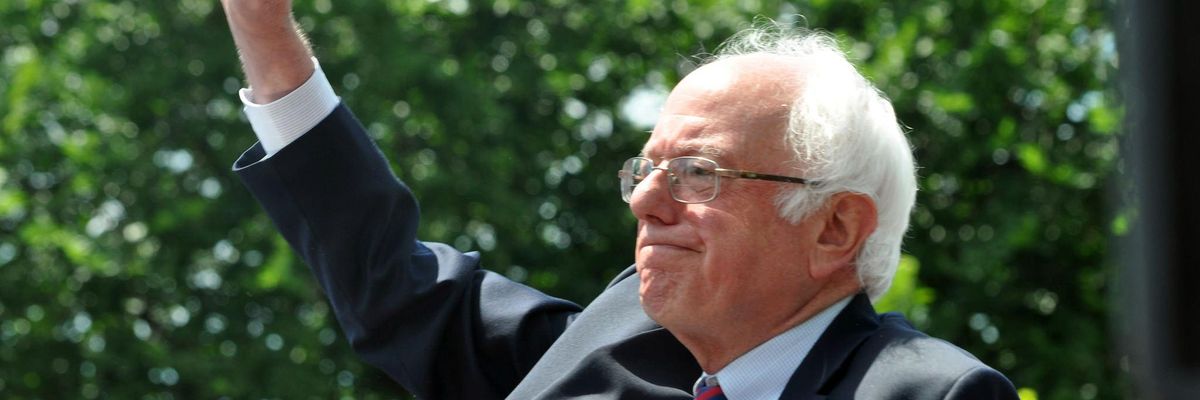Remember back in the primaries when Hillary Clinton, backed up by a chorus of elite media surrogates, told us how Sanders' proposal for universal health care was pie in the sky?
Remember when Paul Krugman wrote a column called "How Change Happens" in which he called Sanders' proposals "happy dreams" and lauded the virtue of incremental change?
He wasn't alone; the entire Democratic establishment and the elite media went after Sanders with the same meme. Nothing ratcheted up their ridicule more than Sanders' proposal for universal health care.
Well, guess what? This week, Sanders introduced a Bill for universal health care which was co-sponsored by nearly a third of the Senate Democratic caucus.
Oh, this Bill is unlikely to pass in this Republican Congress, but it will completely change the terms of the debate about how we do health care in America. And having initiated the debate, universal health care in the US is now inevitable. Getting it is no longer a question of if, rather it is now a question of when.
More importantly, it will become an issue in the 2018 mid-terms, and it will help draw sharp lines between Republicans and Democrats. Or it will if Democrats get their heads out of their collective ass.
Looks like change to me.
It's worth examining why Democrats were so resistant to real change, and why Sanders succeeded in bringing it about. In short, we need to understand how change really happens.
Why the establishment embraces incrementalism
The Democratic establishment, the MSM, and Clinton claimed that the "hard work" of negotiation, compromise, and deal-making is the way change happens. Many still hew to this delusion. What's astounding about this argument is that it ignores the fact that Republicans aren't compromising or deal-making, and haven't since Reagan. For example, they shattered records on filibusters when they didn't control the Senate, and they refused to even consider Obama's appointment to the Supreme Court for over a year when they were in power.
So why, in the face of such overwhelming evidence that incrementalism doesn't work, do pundits, politicians and the press subscribe to this notion?
The answer is simple: politicians who benefit from the status quo will support the status quo. Pundits and media who are an integral part of the elite establishment will resist dramatic change. Incrementalism becomes a rear-guard action against real change.
And the neoliberals in the Democratic Party benefit from the status quo just as much as Republicans do. They both cultivate their campaign contributors using the powers of their office to hand out favors, and the money they get for doing so keeps them in power. We the people are not part of the equation. The story of American politics since Reagan has been one of ever increasing favors to Wall Street, big banks, the ultra-rich, and corporations at the expense of the poor and middle class, labor, our health, the environment and the climate.
The other reason Democrats shied away from substantive change is because they were driven by polls. The polls in turn, were being shaped an aggressive PR campaign--more like a coup, actually--funded by a few rich ideologues and corporations, nearly four decades in the making, designed to brand the word "liberal" as a negative thing. Using think tanks, foundations, endowed academic chairs, and outright purchase of the media, they created the illusion that the US is a center-right country politically.
How change really happens
Change doesn't come from responding to polls; it comes from shaping them.
Change, as Ghandi, Martin Luther King, and the Roosevelts knew, comes from the people, not from "skillful" and "sensible" negotiations with the Party apparatchiks in the establishment. Sanders understands this, too. As he says:
"You don't make change by sitting down with Mitch McConnell, you make change when millions of people demand change." He also said, "When an idea catches fire, when people see the justice of that idea, it moves very, very quickly. When millions of people stand up and fight, they win."
The problem has been, that until Sanders, the people didn't have an advocate. Sanders has shown that the power of the people can make change--the question now, is whether the Democratic Party is interested in change or whether it is married to the status quo.
But we the people have a say and a stake in this. There has never been a better time to take over the Democratic Party, and that might be the biggest change of all, if we can pull it off. Given our system, it's the fastest way to gain power. Yes, the Oligarchy will fight it tooth and nail, but if we're united, if we share a clear vision of a Party of, for and by the people, we can triumph.



